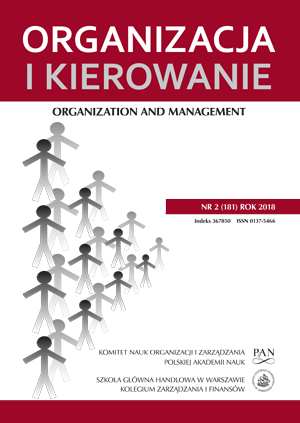ROZWÓJ BADAŃ NAUKOWYCH W ZAKRESIE ZDOLNOŚCI ABSORPCYJNEJ ORGANIZACJI
DEVELOPMENT OF RESEARCH ON ABSORPTIVE CAPACITY
Author(s): Andrzej LisSubject(s): Business Economy / Management, Higher Education , Management and complex organizations, Economic development
Published by: Szkoła Główna Handlowa w Warszawie
Keywords: absorptive capacity; inter-organizational learning; systematic literature review;
Summary/Abstract: The aim of the paper is to analyse quantitative development of research on absorptive capacity and to identify the key research themes within the field with the use of the method of systematic literature review. In order to achieve the aforementioned aim, the following research questions are set: 1) How was the number of publications related to the concept of absorptive capacity changing over time? 2) What are the most influential publications shaping the development of the concept? 3) What are the key research themes identified within the core references in the field of absorptive capacity? 4) What are the recommended streams of further research in the field? The methodology of systematic literature review was applied to achieve the aim of the study. The research procedure consisted of three stages. First of all, bibliometric studies of the number of publications and citations they received were conducted. The Web of Science Core Collection database was used as a source of data for the research sampling process. Secondly, key (the most cited) publications in the field were identified. Thirdly, key research themes were identified through analysing the content of the most cited publications. Referring the findings of the study to the model of the research life cycle, it is observed that the concept of absorptive capacity is still within its development phase. This observation is supported by the evidence indicating a rapidly growing number of research papers published in quality journals in recent years and the growing number of citations within the field. The analysis of core references points out the following key themes in research on absorptive capacity: 1) the assumptions of the absorptive capacity concept and its reconceptualisations, including the processes of absorbing, assimilating, transforming and exploiting of external knowledge in organisations, 2) antecedents and determinants of absorptive capacity of organisations, 3) the impact of absorptive capacity on knowledge transfer, technology skills transfer, innovativeness and corporate performance. Taking into account the growing interest of the academia in exploring the field of absorptive capacity, it is worth noticing the potential streams of further research in the field. Firstly, in order to map the research field thoroughly and identify the research fronts within, it is recommended to conduct a comprehensive bibliometric analysis, including descriptive bibliometric studies, e.g. research profiling methodology, and in particular research topic profiling and citation analysis. Secondly, due to the dominating position occupied within the research output by seminal works issued in the 1990 s and early 2000 s, it is suggested to focus research profiling and content analysis on the most up-to-date papers. Thirdly, due to a dominating position of English as a language of publications in management studies, it is recommended to conduct additional bibliometric studies and topic analysis of publications written in Polish and disseminate their findings in a survey published in English in order to make them available to a wider community of researchers in the global scale. Fourthly, a wider use of qualitative studies is supported, especially those applying the case study methodology. Such a solution would enable to explore absorptive capacity more thoroughly, including organisational mechanisms and routines, which are often omitted in quantitative research studies focused on validating cause-effect relationships hypotheses.
Journal: Organizacja i Kierowanie
- Issue Year: 182/2018
- Issue No: 3
- Page Range: 77-96
- Page Count: 20
- Language: Polish

